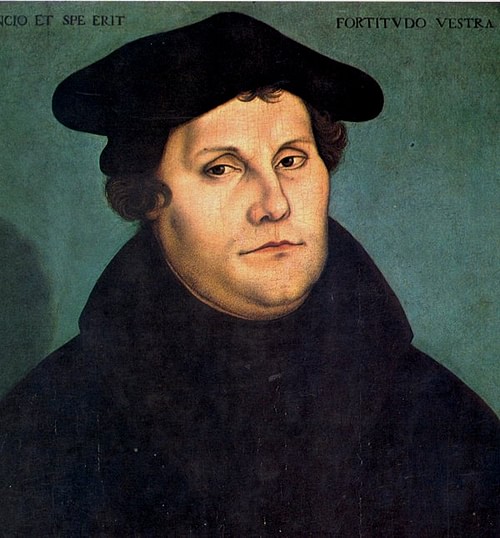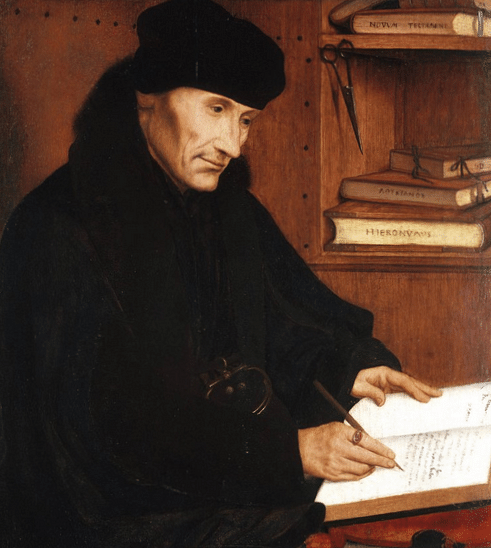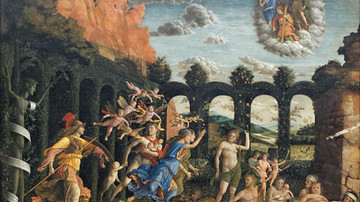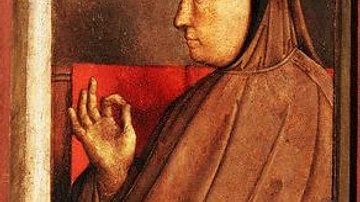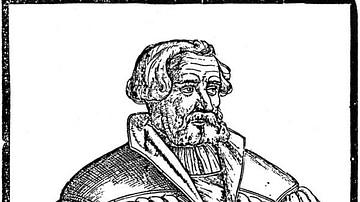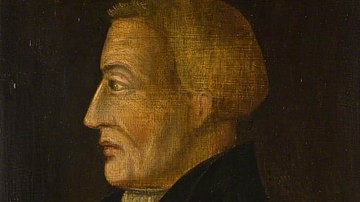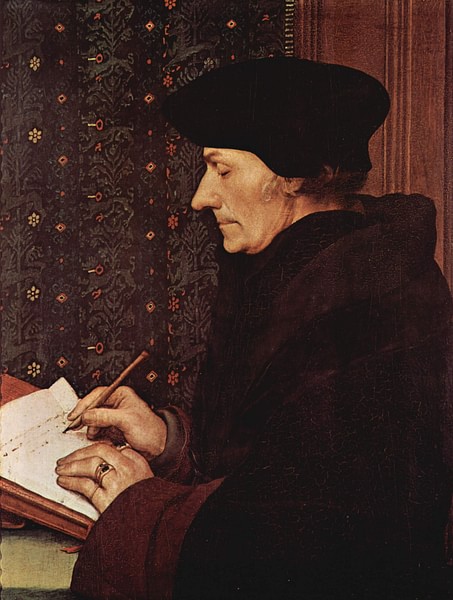
Desiderius Erasmus (c. 1469-1536) was a Dutch humanist scholar considered one of the greatest thinkers of the Renaissance. A prolific writer who made full use of the printing press, he produced editions of classical authors, educational treatises, translations, dialogues, and letters. Erasmus was a great champion of education, believing this was the best way to reform the medieval church.
Erasmus produced new translations of the New Testament into Latin and Greek which were designed for Christian readers to educate themselves rather than rely on the interpretations of others. In this way, along with his methods of textual analysis, he contributed to the Reformation, even if he himself was against radical changes in the Church. Erasmus also believed in the importance of studying classical literature and what it means to be a human. As such, Erasmus is considered one of the founders of the philosophical movement which became known as Renaissance humanism. Finally, it is for all of these reasons that the hugely popular student exchange programme which today operates across Europe was named after him.
Early Life
Desiderius Erasmus was born in Rotterdam on 27 October 1469. His parents were not married as his father, Roger Gerard, was a priest and his mother, Margaret, the daughter of a physician. He went to school at an institution in Deventer in the Netherlands run by the German humanist Alexander Hegius (c. 1433-1498). Hegius promoted the study of classical texts in their original language and not, as was then common, limiting oneself to simply reading commentaries on them. Following the death of both his parents around 1484, Desiderius was packed off to another, cheaper school, 's-Hertogenbosch, still in the Netherlands but this time a religious institution run by the Brethren of the Common Life. This Catholic school prepared boys for a monastic life and so Erasmus missed the chance to continue his studies at university level. Consequently, around 1487, Desiderius joined the monastery of the Augustinian monastic order in Steyn, and there he remained until 1492.
Ordained as a priest in April 1492, Erasmus moved to northern France and worked as a secretary for the bishop of Cambrai, Hendrik van Bergen. In 1495, he was sent to study theology at the University of Paris, and it was now that his passion for classical literature could be pursued as his career path began to change direction. Although the religious studies and lifestyle were not much to his liking, Erasmus at least now had the chance to teach private students and study ancient writers in his free time.
The Printed Word
Erasmus' talents allowed him to secure positions at universities and gain lucrative employment from rulers. He travelled to England in 1499, where he met the scholar Thomas More (1478-1535), then stayed in Italy from 1506 to 1509. It was in Venice in 1508 that Erasmus expanded his 1500 Adagiorum Collectanea an annotated collection of Greek and Latin adages or short sayings. It was this work that first brought Erasmus to the attention of the wider European community of scholars. He revised and reprinted the work again in 1515.
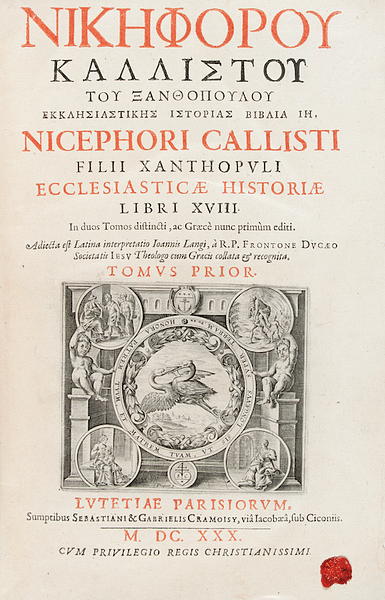
Erasmus returned to England, spending five years there, from 1509. Not a great deal is known of this period except that he worked on his edition of the New Testament (see below) and gave lectures at the University of Cambridge. However, for most of his career, he was able to write as an independent author. He could do this thanks to the recent invention of the printing press. Erasmus cultivated friendships with great thinkers elsewhere in Europe, gave out medals bearing his profile to friends, and wrote a copious amount of letters, but it was through the printed word that his reputation really spread far and wide, as the historian W. Blockmans notes:
He could often be found in the offices and workshops of the Swiss and Italian printers who published his works, and without ever having held a public office of any significance Erasmus achieved the status of a best-selling writer and cultural megastar. At the height of his fame, around 1515, his name was on the lips of every intellectual of importance in Europe.
(297)
The New Testament
Besides his many translations of the works of ancient writers, Erasmus studied the history of the Christian Church, its founding fathers, and the New Testament texts. In 1516, he published his Latin and Greek translation of the New Testament (Novum instrumentum), complete with commentary notes. It would be revised and reprinted five times. Erasmus had searched out and studied ancient and medieval Greek and Latin biblical manuscripts, and he came to the conclusion that some portions had been inserted into the standard editions in the 4th century. In particular, he found the so-called Comma Johanneum verse (I John 5:7-8), which supports the doctrine of the Trinity, did not exist in pre-4th century CE texts and must have been added after the 325 Council of Nicaea (a hypothesis since proved correct by modern biblical scholars).
Aside from these textual improvements in accuracy, Erasmus believed that the Bible, and especially the New Testament, was the best way for ordinary (educated) people to come to know God and salvation. Erasmus hoped that by reading for themselves, Christians would move away from what he considered were the more vulgar aspects of the medieval church such as relics, crusades, and illiterate country clergy. Further, Erasmus sought to change the approach of the Church through its very heart: the biblical text. His translations and edits changed certain concepts to reflect his humanist views. For example, in his edition, he translated the Greek metanoete into resipiscite, a meaning of 'repent' closer to 'return to one's true senses' rather than the previous poenitentiam agite, meaning formal and public acts of penitence. Naturally, conservative elements within the Church did not accept these interpretations.
The Low Countries & Charles V
From around 1517, Erasmus moved back to the Low Countries. Here in Brabant, he became the councillor to Archduke Charles, the future Charles V, Holy Roman Emperor (r. 1519-1556). His Institutio principis Christiani (Education of a Christian Prince) and Querela pacis (Complaint of Peace) were intended to guide Charles and others in their statesmanship and promoted the advantages of peace, not war. The latter text states:
Sit down before you draw the sword, weigh every article, omit none, and compute the expense of blood as well as treasure which war requires, and the evils which it of necessity brings with it; and then see at the bottom of the account whether, after the greatest success, there is likely to be a balance in your favour.
(Campbell, 81)
The following year, Erasmus joined the university in Leuven and worked in the theology faculty. Convinced that a knowledge of languages was the key to a scholar's better understanding of theology, in 1518 he wrote his Ratio verae theologiae arguing his point, but again he struggled against reactionary scholars.
Martin Luther & Religious Texts
Erasmus believed the best way to solve the Church's problems was a more gentle rebirth through the purifying benefits of education, knowledge, and prayer. These ideas were revealed in his c. 1504 Enchiridion Militis Christiani (Handbook of the Christian Soldier). Other religious works like the 1522-24 Paraphrases of the Four Gospels, which provided helpful guides and summaries, ensured Erasmus' popularity kept on growing.
Erasmus had initially been in sympathy with the criticism of the Church by the radical reformist Martin Luther (1483-1546), but in 1524 he published De Libero Animo, his famous essay on free will against Luther's position - where people did not freely choose their salvation but were the subjects of predestination. The work was written while Erasmus was in Basel in Switzerland, but, living there since 1521, the city turned out to be a hotbed of radical reformers, and Catholic worship was banned. Erasmus moved to Freiburg in 1529 where he worked at the catholic university, but he did return to Basel in 1535. It is curious for a man who travelled so widely that in his printed works he was always referred to as 'Erasmus of Rotterdam'.
Erasmus saw the blossoming Reformation movement (as it later became known) as aiming itself at the wrong target. He did not believe it was divisions over doctrine that needed to be healed (or that people holding different views should be persecuted) but that ordinary people needed their faith restored in the Church as an institution and priests as their spiritual guides. In the satirical 1511 Moriae Encomium (Praise of Folly), Erasmus had poked fun at the more absurd elements of Catholicism, especially its tendency towards theatrical show. The work also criticises what he saw as the corruption and disproportional power within monastic communities. Erasmus sought a cleansing of the Church's more morally disreputable corners rather than the radical reformation proposed by such thinkers as Martin Luther. Ironically, though, Erasmus' sharp and critical examination of base texts in the original language and his textual analysis of current versions, would fuel the Reformation when his methods of philology were adopted by later thinkers.
Humanist Legacy
Erasmus died on 12 July 1536 in Basel. He may have failed to build support for a middle ground between traditional Catholics and Reformists but the greatest legacy of his scholarship and long writing career was his contribution to the philosophical movement known as humanism. Humanism was a term coined in the 19th century for Renaissance thinkers who advocated an education which focussed on direct access to and understanding of classical literature. The term 'humanism', however, has since then gathered so much baggage around it that it has largely become redundant. Many modern scholars prefer to state that thinkers like Erasmus were interested in studia humanitatis, that is studies which concentrated on what it is to be human, and more precisely, to consider what is a virtuous individual. Further, humanists, even in Erasmus' era, were a diverse group of thinkers who by no means reached a consensus of opinion on all subjects. Erasmus certainly did not always agree with some Renaissance humanist thinkers; his Ciceronianus, published in 1528, was an attack on those scholars who were too preoccupied with imitating the Roman orator Cicero (106-43 BCE) - although Erasmus himself published many of his own letters, the form of scholarship Cicero was particularly famous for.
Nevertheless, there was a movement towards changing education and having it focus more on classical texts. Within these texts could be found material pertinent to the subjects of Latin grammar, poetry, rhetoric, history, and moral philosophy. It was also considered important to study the ancient idea of virtue in public and private life. Certainly, this did not mean Erasmus and other humanists neglected religious texts but it was the beginning of a slow and irreversible shift in the concept of education which would eventually lead to scholars being able to study entirely secular matters throughout their careers.
Erasmus had another, more immediate and tangible effect on education through his writings. He produced guides for those wishing to establish a school, examples of recommended syllabuses (On the Method of Study, 1511), and numerous textbooks such as his multi-editioned On Copia (1512) which taught students how to argue, revise texts, and produce new ones. His 1521 On Writing Letters taught how to write letters, aim for specific audiences, and employ a variety of expressions. Even the most advanced of scholars continued to use the work of Erasmus. His Greek New Testament was used as the base for new translations by Martin Luther (German, 1522), William Tyndale (English, 1526), and by those scholars who produced the King James Version of the Bible in 1611.
Another legacy is the Erasmus Programme, a student exchange programme which today operates across European countries. Beginning in 1987, the programme permits students to study in another country, fostering the ideas of cultural sharing, toleration, and understanding. As a scholar who himself studied in various countries and who so strongly believed in the power of education, one cannot help but think that Erasmus would have been immensely pleased to have his name associated with such a project.
